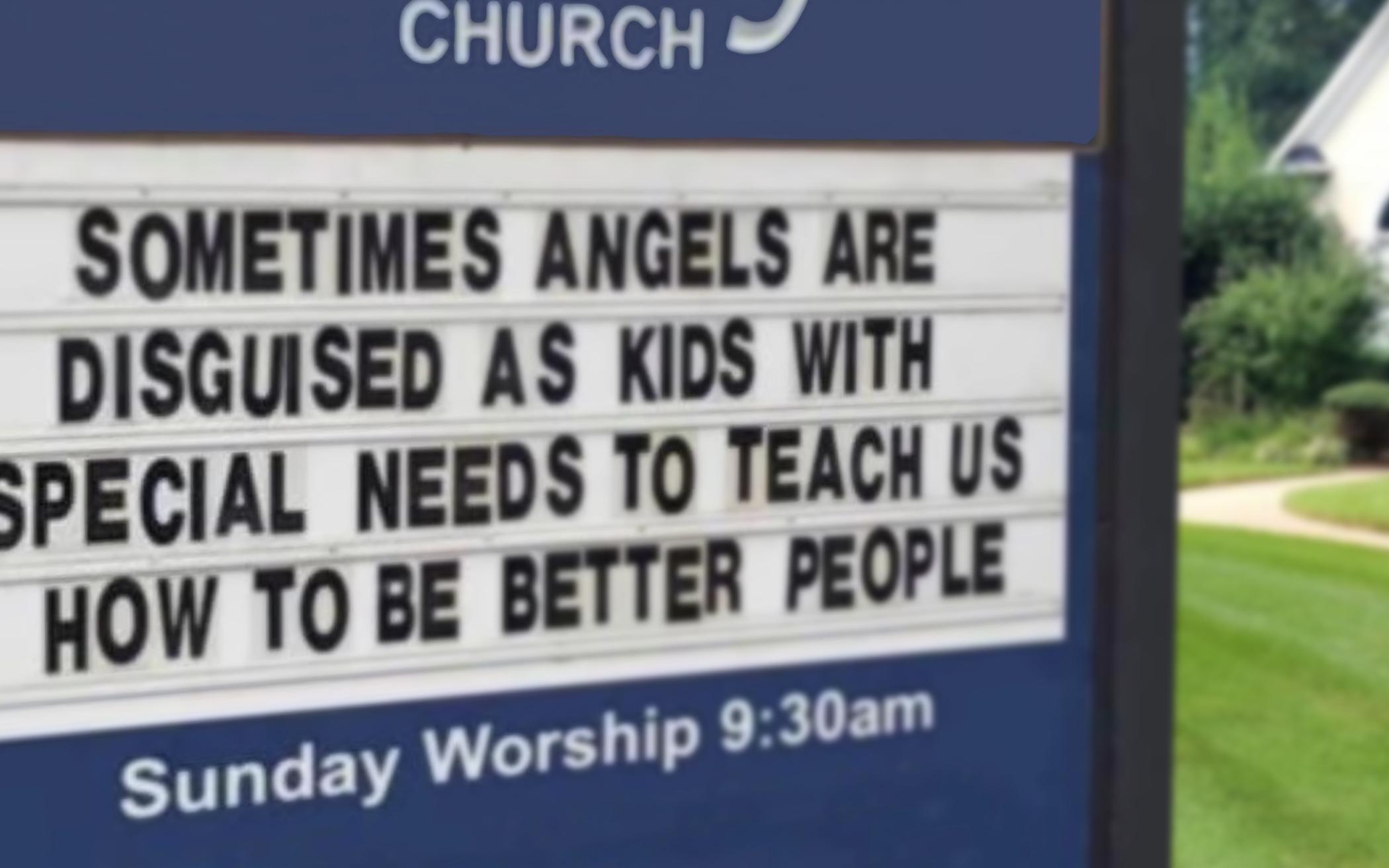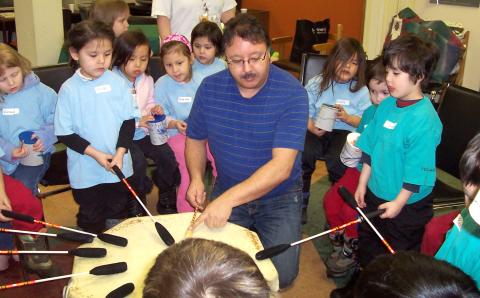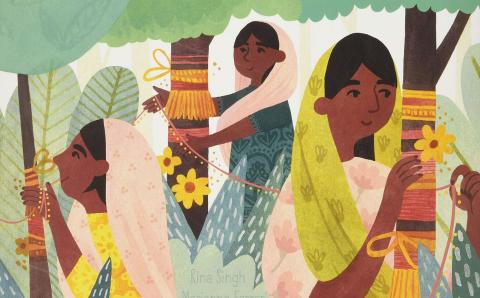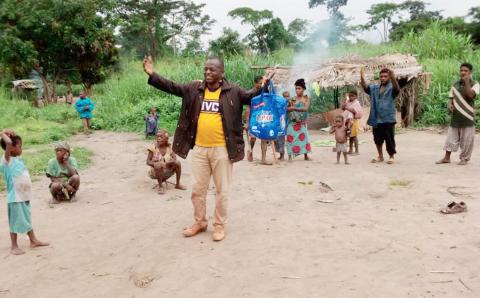It’s a warm September morning, and a group of friends and I are gathered at a local 5K run. Our daughters have just completed the race, and we’re enjoying one another’s company. My phone vibrates in my coat pocket, and a text message appears. It’s from my friend Maggie. “Is it just me, or do things like this make you feel terribly uncomfortable?” she writes under an image of a public sign outside a church. The sign reads, “Sometimes angels are disguised as kids with special needs to teach us how to be better people.” The message isn’t just outside that small-town church; it’s circulating on Facebook.
I pass my phone around to my friends. “Am I crazy for being really put off by this?” Unanimously, the answer is no. I am not crazy. I respond to Maggie, “That’s awful.” But a question nags at me: why is it awful? Maggie and I have sons with Down syndrome, and we often find ourselves in conversations like this one. I confess that before my son was born, I probably would have driven past a sign like that and thought nothing of it. I wonder: am I being too fussy? Does a message like this really do any harm?
This isn’t the first time our families have encountered seemingly sweet messages about individuals with disabilities. There’s the oft-repeated phrase, “God gives special children to special parents.” Then there was the time a pastor-friend asked us if we thought people with Down syndrome are more like Adam and Eve before the fall. There was the article we once read by a theologian who argued that people with disabilities make us feel uncomfortable and teach us because their visible vulnerability makes us confront our own hidden vulnerabilities.
After the kids go to bed that night, my husband and I talk about the sign. “We need an articulate response to why these messages are so damaging,” I insist. “How do we explain it in a loving way to people who don’t see the problem?”
And so I start writing. I write a letter to the church that posted the sign. Imagining all the social media “likes” the image will get fuels my drive to share why that message and sentiments like it continue to marginalize my son.
First, there’s the theology of the statement. Children with special needs are, in fact, children—not “angels.” They are born into sin just as the rest of us are. They need forgiveness just as often as anyone else. Yet the sign’s message suggests that someone who lives with a disability is somehow more innocent than other human beings. Unfortunately, this message joins a mainstream (and not necessarily Christian) narrative that suggests individuals with disabilities are innocent, simple, quaint, and less developed than neurotypical people. This is simply not true from either a scientific or a theological standpoint.
To counter this type of othering, we often use the phrase “more alike than different” when explaining Down syndrome to others. It emphasizes the common humanity we all share, and that having Down syndrome is just one part of who our son is.
Second, likely without meaning to, the sign and messages like it suggest God created some people to serve others. That argument was often used to justify slavery. We must stop making that claim about any people group, whether overtly or subtly, for it only leads to injustice.
Third, statements like that on the church sign position people with disabilities as individuals whose value is dependent on others. It is true that many differently abled people are more physically vulnerable than those who are neurotypical; however, we must not confuse physical dependence on others with value dependence.
Our son was not born just to teach others how to be better human beings. His personhood is not dependent on what the rest of us learn from him. His value comes as an equal image bearer of his Creator God. As a baptized member of the body of Christ, he has the obligation, privilege, and ability to contribute to our congregation and to the larger work of God’s kingdom. As a brother and son, he holds an essential place in our family. As a young boy, he has the opportunity to have friends and to be a friend. As a student, he is fully included in a general education classroom where he learns alongside same-age peers. In short, he belongs in his community as a full, participating member.
Until the church recognizes the inherent, image-bearing value of individuals with disabilities, until differently abled people are called to serve the body of Christ in more meaningful ways (think ministry, leadership, and hospitality), messages like these will continue to be spread as benign, sweet, sentimental, and even true. But take out the phrase “kids with special needs” and replace it with just about any other historically marginalized people group and the sentiment becomes vapid at best, offensive at worst.
As I close the letter to the church, I wonder if I can turn to something more concrete than a personal theology. Isn’t there something in our shared theology that corroborates what I have attempted to articulate? There is. Suddenly I am young again, sitting in my Sunday school class, memorizing the first question and answer of the Westminster Catechism. It has informed so much of how I see and understand my place in God’s world. So I write to the little congregation:
I leave you with this final question and answer that has guided the way we have loved and raised each of our three children. The first question of the Westminster Catechism asks: “What is the chief end of man[kind]?” The answer: “To glorify God and enjoy him forever.” What a complex and joyful commission God gives to each and every one of his children in equal measure. In it, we are invited to live given lives. In it, there is possibility and promise. The scope of that time-tested question and answer is so much greater than the scope of a simple sign or a Christian cliché. Look around at all the richness of God’s world, all the beauty, diversity, and even brokenness. See the beauty difference makes. Affirm it. Celebrate it. But please—do it in a way that preserves the dignity of each and every image bearer of our incredible God. Do it in a way that preserves the dignity of our family and families like ours.
I lower my computer screen. I pray over the words. Lord, let them ring true. I will keep telling these better stories. I will keep at it, because whether or not our differently abled sisters and brothers find room at the table depends on it. What’s more, we are all better when we understand that God created our differences as a gift to his people, not as a burden to bear for the strong, not as a lesson to teach. The stories will start with words like equality, dignity, belonging, and reciprocity. And they will always end with love. These are the words we must share as we communally seek to glorify God and enjoy him forever. These are the signposts that tell us all are welcome here.
About the Author
Sara Korber-DeWeerd is a freelance writer and teacher based in Massachusetts. She and her family are members of Fairlawn Christian Reformed Church. You can find Sara at morethanshelter.blogspot.com.









